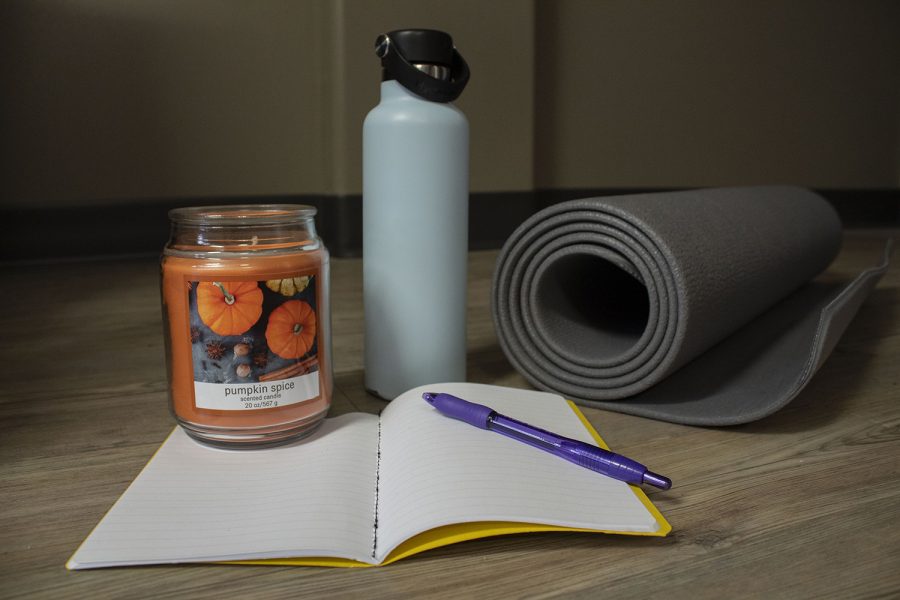Student Wellness launches fall Koru Mindfulness sessions
Student Wellness launched fall Koru Mindfulness sessions in an effort to extend the national program to University of Iowa students experiencing stress and poor mental health. The evidence-based course is designed to improve college students’ ability to use mindfulness and meditative practices with the use of homework, discussion, and reflection.
University of Iowa’s Student Wellness is providing Koru Mindfulness Workshops focused on meditation, mindfulness, and minimizing stress. These workshops run for about 75 minutes once a week for four weeks.
October 28, 2020
As students work through the stresses of exams and essays in a virtual environment, University of Iowa Student Wellness will be hosting a fall Koru Mindfulness workshop via Zoom. The college program was developed by Duke University psychiatrists Holly Rogers and Maragret Maytan, and has since been used by many universities across the nation.
Designed specifically for emerging adults, Koru Mindfulness is a free, four-week workshop that aims to teach participants about effective stress management, mindfulness, and meditation. The course is available to both university graduate and undergraduate students at no cost, according to the student wellness website.
Student Wellness Senior Behavioral Health Consultant and Koru Mindfulness Facilitator Karen Grajczyk said that the course meets weekly for a 75-minute session reviewing mindfulness techniques and reflecting on the program’s homework.
Homework includes the daily use of a Koru Mindfulness app to track meditation and other attributes to mindfulness such as gratitude.
Student Wellness Behavioral Health Consultant and Koru Mindfulness facilitator Haley Hines said National College Health Assessment data shows students on campus are stressed. A spring National College Health Assessment survey of 18,700 students on 14 college campuses found in March through May 2020, a higher proportion of students reported that their mental health negatively impacted their academic performance — 21.9 percent in fall 2019 vs 30.5 percent in spring 2020.
“Student Health surveys show that students on our campus struggle with stress, and that their stress impacts them both interpersonally and academically,” Hines said. “The goal of Koru is to teach mindfulness and meditation skills in an attempt to decrease some of that stress and the other mental health struggles students face as well.”
A pre-pandemic 2019 National College Health Assessment Survey specific to the UI found that 42.9 percent of students reported more than average stress in the last 12 months.
Grajczyk said that the Koru program is not strictly concerned with alleviating stress.
RELATED: Student Health and Wellness splits up
“There’s a lot of great research to show how mindfulness improves mental health in a lot of capacities. It’s proven to help with substance abuse issues, depression, and anxiety,” Grajczyk says. “For students in general, mental health illness onset is during college age. So to have a practice like what we will have with Koru Mindfulness …is such a good way to gain skills about acceptance, resilience, and coping with negative emotions.”
Just weeks after Hines and Grajczyk attended a Koru Mindfulness training seminar in North Carolina during the 2019 spring semester, the university campus closed to prevent spread of COVID-19.
Although sessions were set to begin last spring within an in-person setting, both Hines and Grajczyk believe the pandemic is an especially important time to introduce Koru Mindfulness to the university.
“It was honestly one of those things where it was kind of serendipitous. It was perfect timing for our program,” Hines explains. “We all had to show resilience at that time.”
Student Interventionist Noah Wick said he had a positive experience in a virtual session during the spring semester.
“The program was offered to student employees at Student Wellness last semester to sort of trial the program,” he wrote in an email to The Daily Iowan. “I think we all have a lot more time to be alone with our thoughts now, and a lot more external stressors/anxiety inducers. I think mindfulness can be a great strategy to help cope with and deal with the stress and anxiety that has come along with the COVID-19 pandemic.”
Student Wellness Interventionist Jacob Heid said that the workshops he participated in helped him ease the stress of abruptly transitioning to online instruction during the spring semester. Taking the time to practice meditation was beneficial, Heid said, and hee still uses the breathing techniques he learned in his spring training.
“If you are a student trying to find some ways to cope with stress and deal with all the things going on with this world and you haven’t discovered mindfulness, it could be so helpful,” Grajczyk said. “You can take it now and leave with these practices and skills for the rest of your life.”






